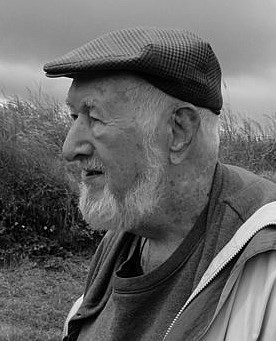
AVIS DE DÉCÈS
John Fraser
18 juillet 1928 – 11 septembre 2023

John Fraser was born in North London in 1928 to the late I. Kenneth Fraser and L. Mary (Rundle) Fraser. In 1991 he was predeceased by his beloved wife, eternal friend and incomparable painter, Carol Hoorn Fraser. He is survived by his sisters Deborah (Geoffrey Gibson), Elizabeth (Michael Pountney); niece Janet and nephews Simon, Christopher and Matthew.
John graduated from Balliol College, Oxford with a BA (1951) and an MA (1955). In between, he taught at Reali School, Haifa, Israel (1951–53). He studied briefly at Columbia University (1953), and then in 1955 he went to the University of Minnesota where he completed his PhD (1961). He was appointed Assistant Professor of English at Dalhousie University in 1961, Associate Professor in 1966, and Full Professor in 1972 before becoming Munro Professor of English at Dalhousie in the final stages of his teaching career (1985–93). In 1993, he became a member of the Royal Society of Canada.
He was a celebrated and much-loved teacher, opening his own house on Oakland Road regularly to students, in a living room with walls decorated by Carol's vivid paintings to further stimulate the discussions. John was also a reticent teacher, allowing students to find their own voice, waiting them out until they did, subduing his own for long periods in the process. In his official course description John extended a special welcome to poets and is often acknowledged for his formative influence. Similarly, as a colleague, he was devoted to the democratic principle of self-administering departments and faculties. He was a workhorse on various committees, encouraging, illustrating, labouring mightily, but always with a certain reserve or modesty that could disguise the ambitious reach of his commitments. His work was instrumental in some of the most formative committees of his time, the one establishing a PhD programme in English (1968–69) or the one designing the structure of the newly formed Faculty of Arts (1986).
In his critical writings he was an essayist in the great tradition of the essay. Their range was astonishingly wide: film and photography; the character and purpose of literary criticism; pornography and the erotic; Shakespeare, Huckleberry Finn, B. Traven; the organic community and the novels of Louis-Ferdinand Celine. His published books, Violence In the Arts, America and the Patterns of Chivalry, The Name of Action (Cambridge UP, 1974, 1982, and 1984) all deal with matters cultural, historical, and sociological—all enlivened and disciplined by his training in philosophy and literary criticism. His work was thoroughly interdisciplinary long before interdisciplinarity became fashionable.
Equally rich and original were the 1990 Alexander lectures delivered at the University of Toronto: Nihilism, Modernism, and Value. This piece was published, during his retirement, on the online website he modestly called “Jottings” (www.jottings.ca), where it is joined by several other book-length studies including Language, Truth, and Consequences, a detailed commentary on Thrillers, various miscellaneous pieces, and Voices in the Cave of Being. The latter is a companion volume to the online poetry anthology A New Book of Verse, which John worked over through most of his adult life and which contains over 600 poems, many accompanied by a rich array of visual illustrations and many perceptively annotated. It offers a cornucopia of English poetry, along with generous samplings of German and French poems (in the original and in translation, often John’s own).
In addition to “Jottings,” John, in his long and productive post-retirement career, also published a series of eleven e-books. Some of these extend the work of his website, a new anthology of 65 French poems, for example, or “A Bit of this and a Bit of that About Poetry,” but others open new investigations, especially into photography and visual culture and, most importantly, on the drawings and paintings of his wife Carol. One side of the “Jottings” website is devoted to Carol’s work, and that together with the e-books and a wonderful essay on her career called “An Educated Imagination” on John’s side of the website testify to the powerful symbiosis of the partnership that was Carol and John. John honoured and survived Carol for 32 years, loving to hum Hoagy Carmichael’s
I get along without you very well
Of course, I do
Except perhaps in spring
But I should never think of spring
For that would surely break my heart in two
Those who loved John will remember him in all seasons. A memorial service will be held at St. Andrew’s United Church, 6036 Coburg Rd, Halifax, NS on November 10, 2023, at 11 a.m.
Montrez votre soutien
Envoyez Vos
Condoléances
Partager
L'avis De Décès
Obtenir les mises à jour
Prestations de Service
Partager l'avis de décèsPARTAGER
- RECEVOIR DES RAPPELS
v.1.18.0